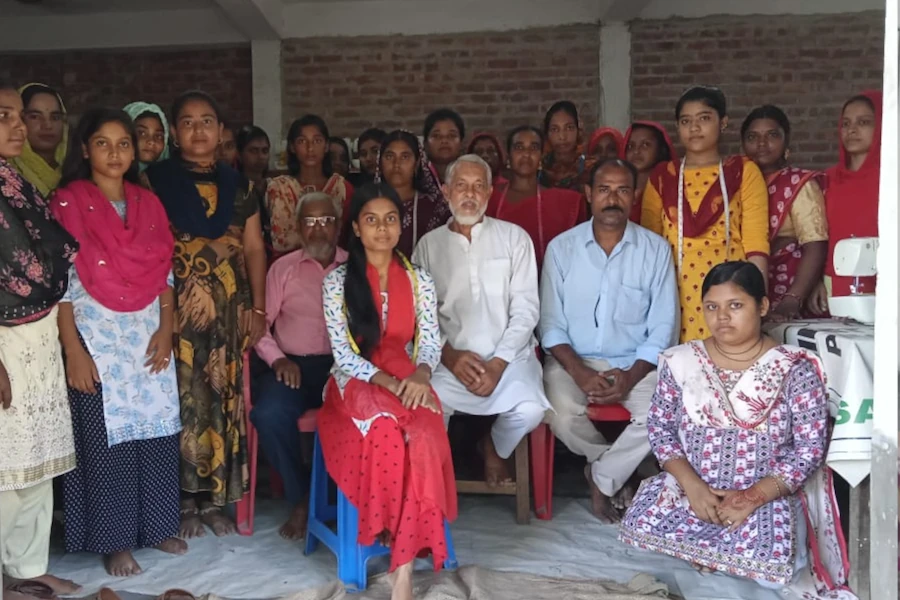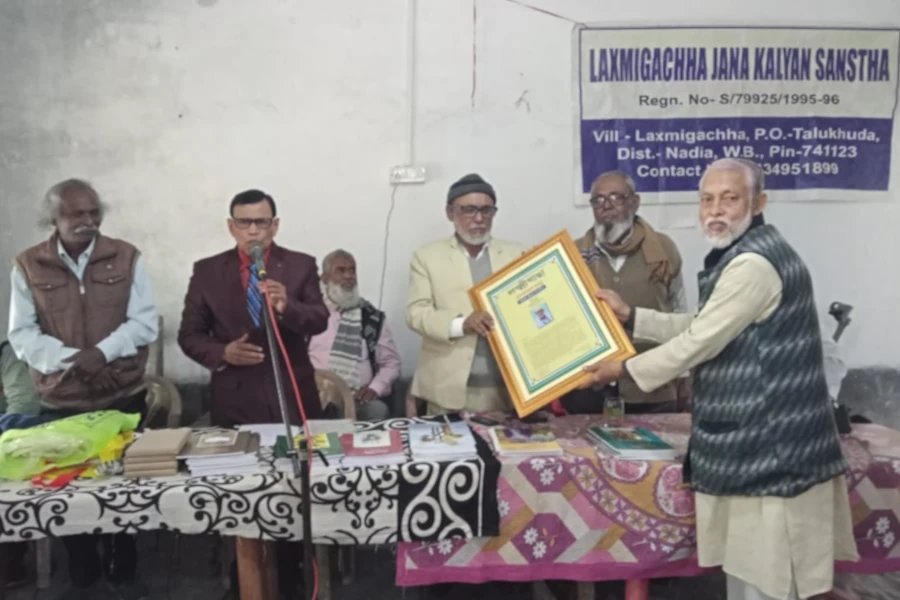
Qutub Ahmed/Nadia
Hafizur Rahman has devoted his life to empowering girls from marginalized backgrounds through his social organization, Lakshmigachha Janakalyan Sangha.
Known affectionately as Hafizur Sahab in his native village of Lakshmigachha—under the Chapra police station in Nadia district, about 140 kilometers from Kolkata—he has become a symbol of resilience and grassroots service.
At 80, he lives a simple life, preferring to remain close to the people he serves. His humility, persistence, and indomitable spirit have won him the admiration of all around him.
 Hafizur Rahman with women trainees
Hafizur Rahman with women trainees
When I met him at the Lakshmigachha bus stand early one morning, he was holding the hand of his grandson. With a warm smile, he guided me to his home.
Along the way, I passed small huts and pacca houses, scattered across the rural lanes. I could observe a few Hindu families living in what is other wise a Muslim neighbourhood. The smiles on their faces reflected the peace and the spirit of harmony that defines rural Bengal.
At his modest home, Hafizur Sahab began narrating his journey. Founding Lakshmigachha Janakalyan Sangha had not been easy—he endured hunger, slept at Sealdah station barely eating a few morsels of rice, and faced many rejections.
Yet his mission to empower disadvantaged Muslim women— widows, divorcees, and abandoned wives—never wavered. At one point, he even sold his farmland to purchase sewing machines for them.
.webp) An instructor with women trainees at the sewing training center
An instructor with women trainees at the sewing training centerFor years, Hafizur sought to meet the renowned industrialist and philanthropist Mostak Hossain at his Park Street office. After nearly eight years of perseverance, he finally succeeded.
Hossain not only donated ₹15 lakh to build a training center for Lakshmigachha Janakalyan Sangha but also funded sewing machines and other initiatives, and also promised support in the future.
In 1995, Hafizur Rahman, along with six close associates, including Surabuddin Biswas, formally established the Sangha. They began with a rented room in Chapra, where sewing lessons were offered to women. With no steady funds, Hafizur sold rice from his fields and someone bit into his savings for the sake of his mission.
Gradually, the proceeds from the sale of handmade products by his trainees helped sustain the effort.
From 1995 until the COVID-19 lockdown of 2020, nearly 2,000 girls were trained here. Most of them are running their own small businesses are are self-reliant, supporting their families and building independent lives. The organization also distributed sewing machines to 60 underprivileged girls, extending opportunities to both Muslim and Hindu beneficiaries.
.webp) Women trainees at Sangha run by Hafizur Rahman
Women trainees at Sangha run by Hafizur RahmanWith Hossain’s support, the Sangha eventually built its own training center on a picturesque patch of land surrounded by greenery and ponds, reminiscent of Shantiniketan. After a long pause during the pandemic, operations resumed in 2024.
Today, the center houses 40 sewing machines and has already begun training a new batch of girls, including Azma Khatun, Nasrina Khatun Biswas, Serena Bibi, Shampa Mondal, Parmita Karmakar, and many others. Some are students funding their own education, others are shouldering household responsibilities—but all share the goal of becoming self-reliant.
To guide them, Hafizur enlisted Achintya Khan (Vishubabu), a seasoned trainer with 30 years of experience and a degree from St. Stephen’s Vocational Training Center. His expertise ensures that the girls not only learn sewing but also the discipline and professionalism needed for long-term success.
The Sangha’s work goes beyond vocational training. On the last Sunday of every month, doctors are invited for health check-ups, eye exams, and the distribution of free medicines. Hafizur also dreams of creating alternative livelihood options for local youth, so they do not have to migrate for work.
 Hafizur Rahman receiving an award
Hafizur Rahman receiving an awardHis family once worried about his sacrifices—selling land, neglecting personal comforts, dedicating every resource to social service. But Hafizur remained steadfast, drawing inspiration from the life of the Prophet Muhammad, especially in moments of hunger and despair.
Over the years, he has interacted with several noted personalities, including Basir Sahab of Palashi, Partha Sengupta of the Encyclopedia Council, Miratun Nahar, and Abdur Rauf of Chaturanga. While funds remain a challenge, Hafizur draws hope from past benefactors like Mostak Hossain and is open to seeking public support whenever needed.
READ MORE: Imran Nahar revived Bengal’s vanishing proverbs and fairy tales
Guided by the Qur’an (Surah Al-Kahf, Ayat 106 and Surah Luqman, Ayat 27) and the Sunnah, Hafizur Rahman continues his journey as a tireless traveler on the path of light. His life is a testament to what unwavering faith, sacrifice, and service can achieve—not just for individuals, but for entire communities.
